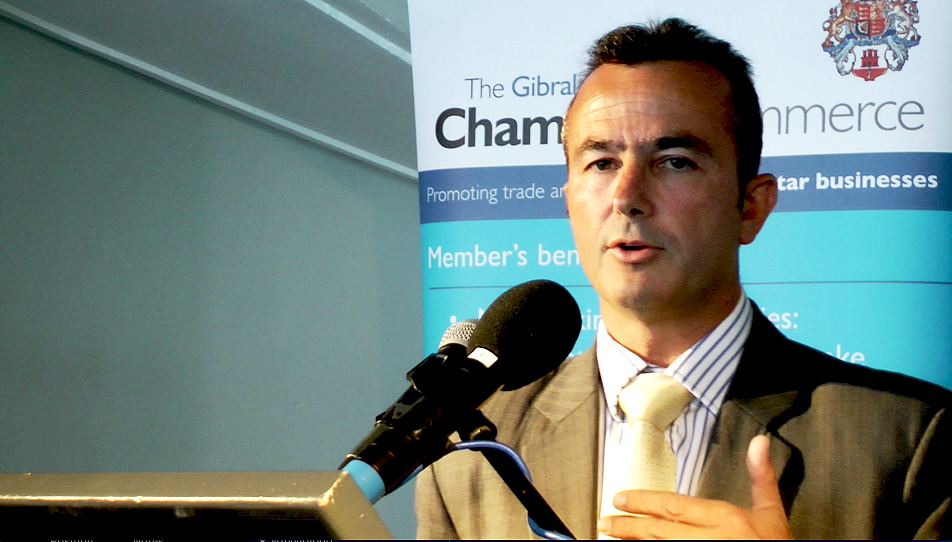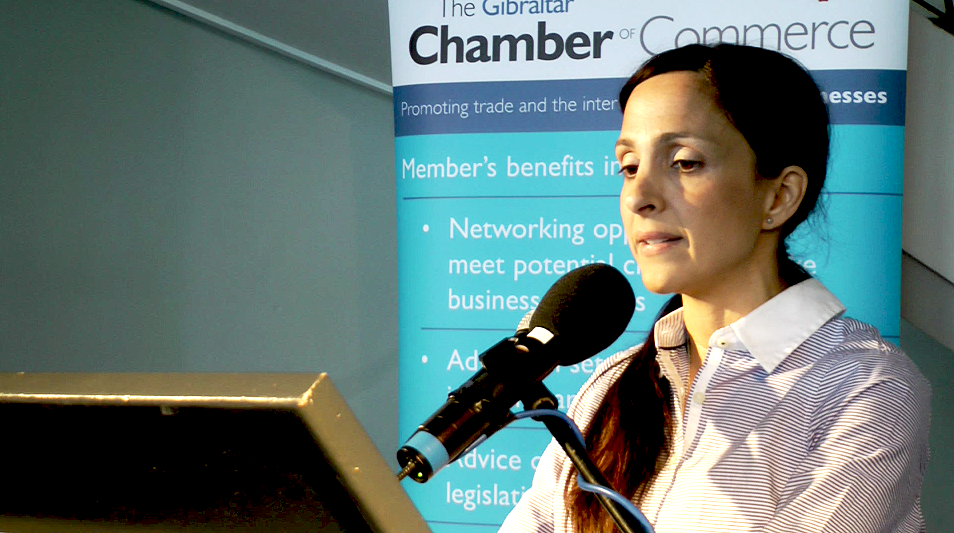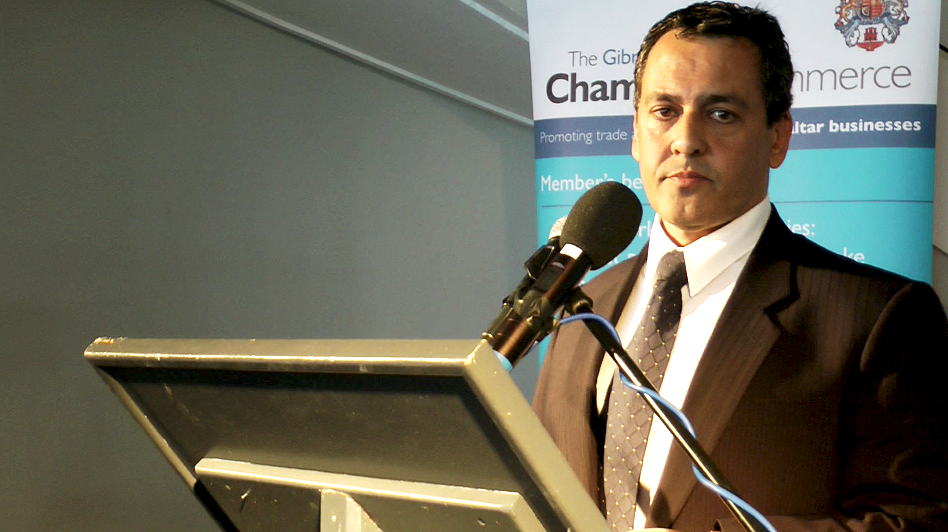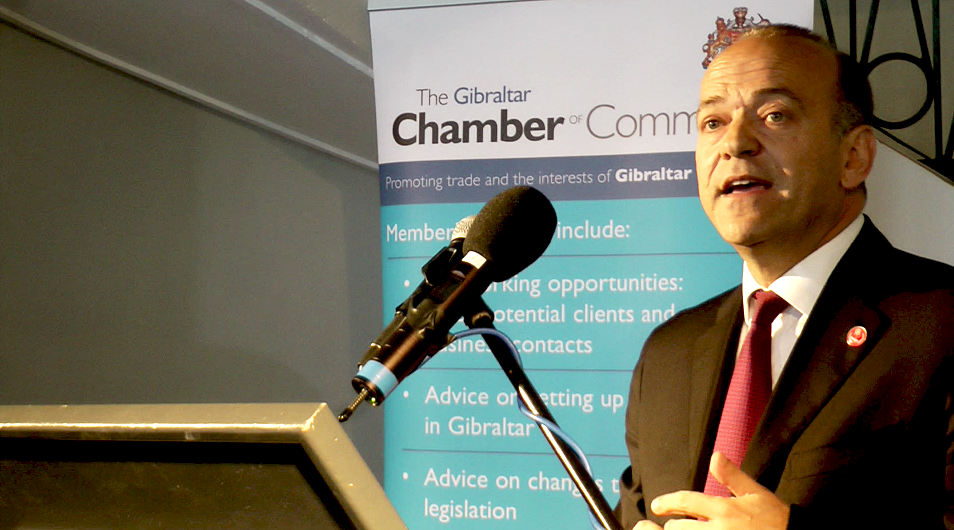June 27 - Chamber Of Commerce By-Election Candidates Dinner
 Last night, the Caleta Hotel hosted the Chamber of Commerce by-election dinner giving each of the four candidates the opportunity to speak to the business community ahead of next week’s vote.
Last night, the Caleta Hotel hosted the Chamber of Commerce by-election dinner giving each of the four candidates the opportunity to speak to the business community ahead of next week’s vote.
First up was the PDP’s Nick Cruz who delivered a witty speech on his approach to politics. Mr Cruz opened by noting that he viewed the recent GBC opinion poll in a positive light, saying that it showed that 22% of the electorate were dissatisfied with the two major parties. He joked that he had doubled his vote from 4% to 8%, saying that he was “on a bit of a roll” and he reminded the diners that the poll was conducted before the political campaigns had started in earnest. Mr Cruz insisted that there was “all to play for” and said that the 4th of July represented a “D-Day” for him.
 Focusing on the major message of his campaign, Mr Cruz said that the by-election was not about Government but about enhancing democracy. He explained that it was important for there to be a strong, effective Opposition which could hold the Government to account and rejected the suggestion that adding one more voice to Parliament would only add to the “bickering and arguing” saying that he represented “constructive politics.”
Focusing on the major message of his campaign, Mr Cruz said that the by-election was not about Government but about enhancing democracy. He explained that it was important for there to be a strong, effective Opposition which could hold the Government to account and rejected the suggestion that adding one more voice to Parliament would only add to the “bickering and arguing” saying that he represented “constructive politics.”
The PDP, he said, was dedicated to constructive proposals and the search for solutions particularly regarding concerns about the style of government, equality and the fishing dispute. He said that the Government’s policies on employment were “nationalistic” and that the PDP had led on many other important and currently controversial issues.
He ended his speech by appealing to the business community to think about which candidate would serve it better and whether a new voice would be able to represent their concerns.
His speech was followed by Marlene Nahon who will be standing for the GSD. Ms Nahon started by giving a brief picture of her personal and family background. She said that political debate had been the “backdrop” of her dinnertime conversations at home and that she considered that a vital part of politics was the ability to listen to people. Ms Nahon explained that, after studies in the UK and a stint at a private bank, she had dedicated her energies to raising her growing family.
Speaking about why she had decided to stand for election she said that, despite showing initial promise, after 18 months of GSLP-Lib rule she had come to the conclusion that no real change had taken place and that the promised “new dawn” had failed to materialise. She cited the handling of the fishing dispute and the statements on public finances as some examples where, in her opinion, the Government had failed and merely sought to “trash” the GSD’s legacy.
 Reiterating the GSD’s position, she attacked the Government’s pre-election warnings of “financial black holes” and said that there was a culture of expectation fuelled by “undeliverable promises.” Among these promises she singled out the Future Jobs Strategy for criticism arguing that it was a misguided scheme which did not guarantee structured training.
Reiterating the GSD’s position, she attacked the Government’s pre-election warnings of “financial black holes” and said that there was a culture of expectation fuelled by “undeliverable promises.” Among these promises she singled out the Future Jobs Strategy for criticism arguing that it was a misguided scheme which did not guarantee structured training.
“To me, politics should be about creating a fair, well-balanced society,” she said.
As an alternative to the Government scheme, she proposed possible school and business partnerships which would guide students through education and career choices saying that one had to be “ahead of the game” and invest in skills that would be needed and valued by employers in the future. Ms Nahon said she wanted to see locals getting jobs through hard work and merit not because they were satisfying some imposed quota.
She ended by saying: “I feel that I can represent you all in Opposition because I can disagree without being disagreeable.” She promised to work as a “positive force” to hold the Government to account.
Independent candidate Bryan Zammit was next and he stated that the main reason why he was standing was because he believes that the current party political system doesn’t work. As an alternative to the present system, Mr Zammit proposed a new arrangement whereby individuals would be voted into specific ministries covering areas they were professionally competent in. He lamented the nature of political deabte which had, he said, descended to the level of a “ping-pong” exchange of blame and personal attacks which was detrimental to Gibraltar.
 Mr Zammit also emphasised that there was a need locally for greater accountability and transparency claiming that administrations past and present spent money without any real control, citing the runway tunnel and the “infamous” Theatre Royal as two prominent examples. He continued by arguing that Gibraltar’s tourist product was underexploited and gestured towards the hall’s wide windows drawing attention to what he described as a “mountain of rubble.”
Mr Zammit also emphasised that there was a need locally for greater accountability and transparency claiming that administrations past and present spent money without any real control, citing the runway tunnel and the “infamous” Theatre Royal as two prominent examples. He continued by arguing that Gibraltar’s tourist product was underexploited and gestured towards the hall’s wide windows drawing attention to what he described as a “mountain of rubble.”
He said that under the present arrangement the electorate was getting the “wrong people” for the running of Gibraltar many of whom, he claimed, “don’t understand economics or business; they just go through the motions.”
Speaking in more detail, Mr Zammit said that one area that needed development was the training of school leavers who were not academically driven. He said that these students have “nothing to go to” and suggested the creation of a City and Guilds college or a catering college to accommodate their needs.
He made a call for an end to the deep divisions that continue to affect local politics and urged politicians to unite on important but divisive problems like foreign relations. He concluded by saying that he was the instrument through which major changes could be brought about via a referendum on party politics.
The final candidate was the GSLP’s Albert Isola who said he had often attended Chamber dinners but had never expected to be giving a speech as a candidate. As the last speaker, Mr Isola had the benefit of being able to reply and add to some of the points raised by the other candidates. He said that the GSD had failed over 16 years to provide a solution to Gibraltar’s power generation and grid problems and praised his own party for moving quickly to address this.
 Speaking about the Future Jobs Strategy, he said that the GSLP’s employment policies were not a “failed scheme” and that the Opposition ought to give the strategy “a chance and wish it well” repeating the reported increase in the number of jobs for local residents. Mr Isola explained that another scheme which was specifically for graduates returning from university had also been successful using as an example a graduate who had been involved in the design of the disabled access works recently completed at Catalan Bay. He said this programme was “sensible and logical” and was an essential part of preparing young people for employment by giving them experience and training.
Speaking about the Future Jobs Strategy, he said that the GSLP’s employment policies were not a “failed scheme” and that the Opposition ought to give the strategy “a chance and wish it well” repeating the reported increase in the number of jobs for local residents. Mr Isola explained that another scheme which was specifically for graduates returning from university had also been successful using as an example a graduate who had been involved in the design of the disabled access works recently completed at Catalan Bay. He said this programme was “sensible and logical” and was an essential part of preparing young people for employment by giving them experience and training.
He said that the Chamber members and the companies they represent were the “engine of the economy” and assured them that the present Government worked together as a team and listened to concerns and objections contrasting this with the “presidential” regime operated by the GSD. “This is consensus politics and this has to be good for the private sector and good for Gibraltar.”
He said that this was an election for a Government seat and that if people were serious about putting Gibraltar first, “there can only be one choice – vote for someone who’s going to work for you.”






